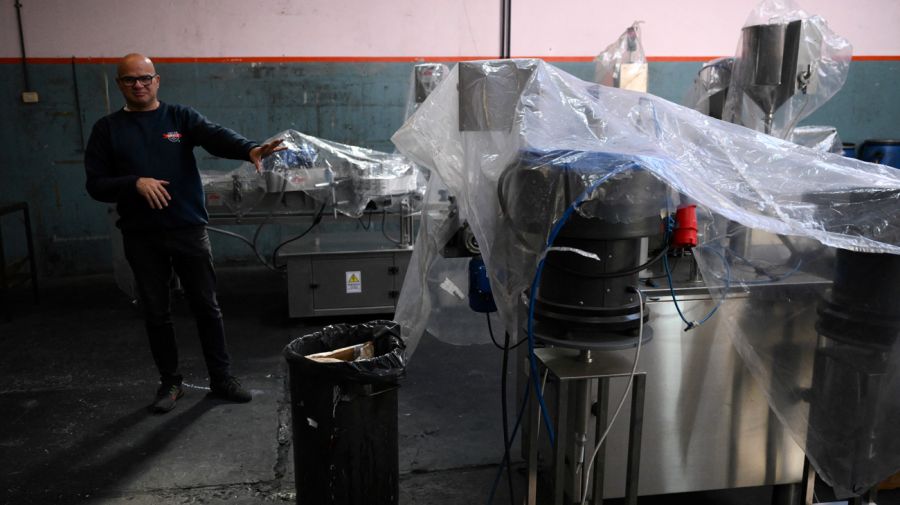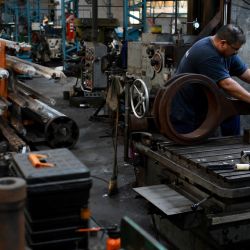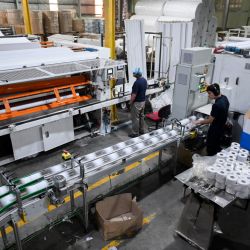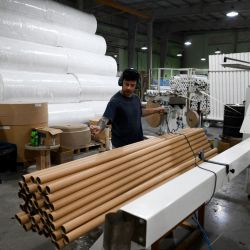Industry is on the ropes in Argentina. The nation's factories, like many economic sectors, are floundering between adjustment and recession as consumers hit by sky-high inflation and shrinking income buy fewer goods.
Economic activity has been falling for four consecutive months until February, according to the latest official data.
Few hold out hope that things will get better any time soon.
"People still have savings" for now, said Gustavo Ávalos, who owns the Tintas Opalo ink factory in Avellaneda, Greater Buenos Aires. But "the outlook is bleak."
Indeed those savings may run out soon enough, with annual inflation approaching 290 percent and wage-earners losing about a fifth of their purchasing power.
Economic activity dropped 3.2 percent year-on-year in February and by 0.2 percent from January as President Javier Milei's budget-slashing plans took hold. He has sought to deregulate the economy and undo trade protections, also devaluing the peso by 50 percent.
Eight sectors recorded an annual decline, including construction, manufacturing, wholesale and retail.
Some small- and medium-sized businesses (SMEs) "can't pay salaries, others can't pay rent," said Ávalos, whose factory sales fell by more than two-thirds in December and by 40 percent in March.
Energy prices skyrocketed 500 percent during the same period.
"I can hold on for a year, then we'll see," summarised Ávalos. "Without consumption we... die bit by bit."
The drop in orders has made use of the brand-new automatic packing machine he bought in December unnecessarily. They are still being wrapped by hand on the middle of the workshop floor.
“They pack some 8,000 jars every day,” Ávalos said proudly. “But we’re back to packing by hand so as not to suspend anyone.”
The factory-owner’s story is one repeated across Buenos Aires Province, the vast region that is home to 40 percent of the population and much of the industrial sector.
Appraisals of machinery for auction have increased at a frantic pace, said Adrián Mercado, the founder of an eponymous auction company.
Cutting back on cupcakes
SME chamber CAME says manufacturing output among its members dropped by nearly 12 percent year-on-year last month and by 20 percent for the first quarter.
The business chamber for small- and medium-sized firms, CAME, says manufacturing output among its members dropped by nearly 12 percent year-on-year last month and by 20 percent for the first quarter.
The majority of the country's SMEs, or PyMES as they are known locally, produce exclusively for the domestic market.
"SMEs don't see a floor [to the downward trend] in the short term," CAME said in a recent statement.

Big business doesn't, either.
Steel company Acindar, from the ArcelorMittal group, said in March it was stopping production for a month at four plants to compensate for a 40-percent drop in sales of the commodity.
In Caseros, in western Greater Buenos Aires, cookie factory Dulcypas makes biscuits at half-speed. Its half-empty offices have desks to spare and at the plant, two production lines have been halted.
The founder’s grandson and current owner Fernando Martinez said he has had to fire staff, reduce salaries and limit output. But he remains optimistic. Numbers are kept up by direct points of sale and exports to Uruguay.
“We have an idle capacity of 50 percent,” he specified. “We’re experiencing a major adjustment. There’s little money, prices are rising rapidly and then consumption is being cut.”
"The biscuits sell very well because they are cheap," he said. "The cupcakes? More expensive, not so much."
“In order to keep up profitability we had to dismiss staff, lower salaries and production volumes”, he said. They also set technology aside.
The International Monetary Fund has forecast Argentina's economy will contract 2.8 percent this year before rebounding with growth of about five percent in 2025.
Calls for regulation
At Industrias Baigorria, which produces screws and fastening elements for the auto and agricultural sectors, sales have dropped by 30 percent since last January.
“A plunge is felt in the market. Many clients tell us they’re not selling anything,” explained Belén Lo Russo, the firm’s foreign trade manager.
Paper mill owner Daniel Rosato, who is also president of the Industrial Union of Berazategui – a grouping of factory owners on the southern outskirts of the capital – is pessimistic.
He said some 600 SMEs that exported manufactured goods have closed since last year.
“Supplies in dollars have increased,” said Rosato. “There is no industrial policy.”
"The other side of that is a rise in informal work, which represents less income for the state," he told AFP.
For Alejandro Bartolini, who owns oil pump producer Metalcrom, fair competition is the only way out.
"The only way is by competing. We don't believe in closed markets, but we also don't believe that indiscriminate opening can lead to success, because manpower and capital will be lost if the [entry of products from the] foreign market is not regulated," he said.
“Milei has not mentioned SMEs, production, work; the only thing we heard is ‘adjustment, zero deficit, there’s no money,’” he complained.
"Labour and capital will be lost if we do not regulate the external market."
by Sonia Avalos, AFP























Comments